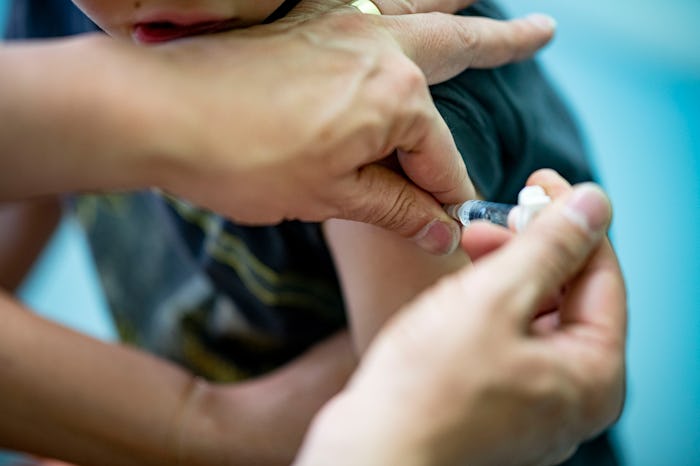News

Pediatricians Urge FDA To Approve Covid Vaccine Use In Kids ASAP
“The rise of the Delta variant changes the risk-benefit analysis for authorizing vaccines in children.”
As Covid-19 cases rise in children, the American Academy of Pediatrics (AAP) has urged the Food and Drug Administration (FDA) to approve a safe and effective Covid-19 vaccine for children under the age of 12 as soon as possible. In a letter to Acting FDA Commissioner Janet Woodcock, the AAP asked the agency to consider how their recent decision to push vaccine manufacturers into expanding the size of pediatric Covid-19 vaccine trials may impact children preparing to head back to school this fall amid a surge in cases driven largely by the highly transmissible Delta variant.
“We understand that the FDA has recently worked with Pfizer and Moderna to double the number of children ages 5-11 years included in clinical trials of their Covid-19 vaccines,” the AAP wrote in its letter to Woodcock. “While we appreciate this prudent step to gather more safety data, we urge FDA to carefully consider the impact of this decision on the timeline for authorizing a vaccine for this age group. In our view, the rise of the Delta variant changes the risk-benefit analysis for authorizing vaccines in children.”
Last week, the AAP announced data collected and shared in partnership with the Children’s Hospital Association had shown nearly 72,000 children tested positive for Covid-19 in one week alone. A total of 71,726 children were confirmed to have the virus between July 22 and July 29, a massive jump from the 38,654 pediatric cases reported the previous week. According to the AAP, it was the largest week-over-week percentage increase researchers have seen in pediatric Covid-19 cases since the pandemic began. As of July 29, children make up 19% of weekly cases.
“The higher proportion of cases in this population means this age group could be contributing in driving continued spread of COVID-19,” the AAP cautioned the FDA in its letter. “Sadly, over 350 children have died of COVID since the start of pandemic and millions of children have been negatively impacted by missed schooling, social isolation, and in too many cases, the death of parents and other caregivers.”
In its letter, the AAP argued children’s current ineligibility for Covid-19 vaccines has played a large part in the rise of pediatric Covid-19 cases. The pediatrician group urged the FDA to consider using data from vaccine trials’ initial cohorts to authorize a Covid-19 vaccine for kids ages 5 to 11 rather than waiting for data from the expanded cohorts to become available.
“The FDA should strongly consider authorizing these vaccines for children ages 5-11 years based on data from the initial enrolled cohort, which are already available, while continuing to follow safety data from the expanded cohort in the post-market setting,” the letter read. “This approach would not slow down the time to authorization of these critically needed vaccines in the 5–11-year age group.”
Additionally, the AAP urged the FDA not to extend the follow-up timeline of trials, which would also delay vaccine approval. Rather, they argued there was no biological plausibility that serious adverse immunological or inflammatory reactions would occur more than two months after an individual has received a Covid-19 vaccine.
“Based on scientific data currently available on Covid-19 vaccines, as well as on 70 years of vaccinology knowledge in the pediatric population, the Academy believes that clinical trials in these children can be safely conducted with a 2-month safety follow-up for participants,” the group said in their letter. “Waiting on a 6-month follow-up will significantly hinder the ability to reduce the spread of the hyper infectious Covid-19 Delta variant among this age group, since it would add 4 additional months before an authorization decision can be considered... We urge your continued dedication to help ensure that COVID19 vaccines for children can be authorized as swiftly as possible so that children of all ages can benefit from them.”
If you think you’re showing symptoms of coronavirus, which include fever, shortness of breath, and cough, call your doctor before going to get tested. If you’re anxious about the virus’s spread in your community, visit the CDC for up-to-date information and resources, or seek out mental health support. You can find all of Romper’s parents + coronavirus coverage here.